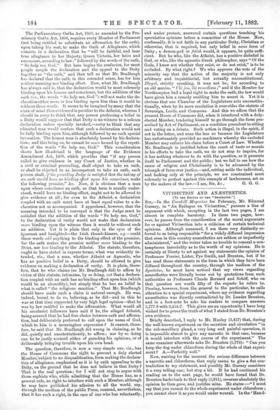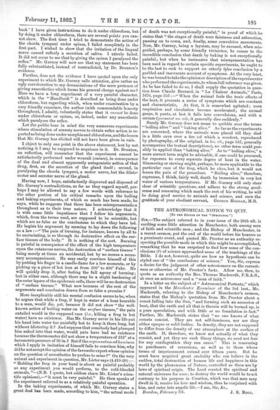VIVISECTION AND AN/ESTHETICS.
[To THE EDITOR OP THE " SPECTATOR:1 Stn,—In the Cornhill Magazine for February, Mr. Edmund Gurney, in "An Epilogue on Vivisection," pursues a line of argument with which, excepting in the last two pages, I am almost in complete harmony. In these two pages, how- ever, he passes from the consideration of the moral arguments for or against Vivisection into a criticism of certain technical opinions. Although unnamed, I am there very distinctly re- ferred to as being responsible " for a widely diffused impression that even in this country anaesthetics are seldom or imperfectly administered," and the writer takes no trouble to conceal a con- temptuous incredulity as to the worth of my opinions. He is certainly at liberty to set against my statements the opinion of Professors Ferrier, Lister, Pye Smith, and Brunton, but if he has read those statements in the form in which they have been diffused throughout the country, through the medium of the Spectator, he must have noticed that my views regarding anaesthetics were literally borne out by quotations from such authorities as Professors Claude Bernard and Schiff, who on that question are worth fifty of the experts he refers to. Passing, however, from the general to the particular, he calls attention to a special experiment, where my evidence regarding anaesthetics was directly contradicted by Dr. Lauder Brunton, and in a foot-note he asks his readers to compare answers 5,777-8 with 3,454-7. This gives me an opportunity I have long wished for to prove the truth of what I stated from Dr. Brunton's own evidence.
Briefly described, I reply to Mr. Huxley (3,457) that, during the well-known experiment on the secretion and circulation "in. the sub-maxillary gland, a very long and painful operation, it is impossible almost to give any narcotic in that case, because it would interfere with the course of the experiment." The same examiner afterwards asks Dr. Brunton (5,778): " Can you keep the dog under chloroform during the whole of that experi- ment ? A.—Perfectly well."
Now, waiving for the moment the serious difference between a narcotic and chloroform, that reply seems- to give a flat con- tradiction to my statement, and possibly Mr. Gurney considers it a very telling one; but stop a bit. If he had continued his reading on to the next page, he would have found that Dr. Brunton harks back to that reply (5,811), reverses absolutely the opinion he then gave, and justifies mine. He states :—" I must say that you cannot do the whole experiment under chloroform ; you cannot show it as you would under wourali. In the.' Hand-
book' I have given instructions to do it under chloroform, but by doing it under chloroform, there are several points you can- not show. The first time I tried to demonstrate the action of the chorda tympani under opium, I failed completely in the first part. I wished to show that the irritation of the lingual nerve caused reflexly a secretion of saliva. I utterly failed. It did not occur to me that by giving the opium I paralysed the reflex." Mr. Gurney will now see that my statement has been fully substantiated, instead of contradicted, by Dr. Brunton's evidence.
Further, does not the evidence I have quoted upon the only experiment to which Mr. Gurney calls attention, give rather an ugly corroboration to my denunciations of the mere pretence of %giving anaesthetics which forms his general charge against me? Here we have a long experiment of a very painful character, which in the " Handbook " is described as being done under chloroform, but regarding which, when under examination by a very friendly examiner, the author (with commendable honesty 'throughout, I admit), voluntarily states that it cannot be done under chloroform or opium, or, indeed, under any anaesthetic which paralyses the reflex.
Let the public bear in mind the very numerous experiments where stimulation of sensory nerves to obtain reflex action is re- ported as being done under morphia and chloroform, and the lesson that Mr. Gurney has elicited will not have been given in vain.
I object to only one point in the above statement, lest by not noticing it I may be supposed to acquiesce in it. Dr. Brunton, on reflection, will remember that the experiment cannot be satisfactorily performed under wourali (curare), in consequence of the dual and almost apparently antagonistic action of that drug, first, on the secretion of the gland itself ; second, in paralysing the chorda tympani, a motor nerve, but the dilato- motor and secretor nerve of the gland.
Having now, I hope, satisfactorily disproved and disposed of Mr. Gurney's contradictions, as far as they regard myself, per-
haps I may be allowed to say a few words with reference to the other portion of his critical remarks upon the boiling and baking experiments, of which so much has been made, he says, while he suggests that there has been misrepresentation throughout as to their true nature. I acknowledge that it is with some little impatience that I follow his arguments, which, from the terms used, are supposed to be scientific, but which are as false as the conclusions to which they have led. He begins his argument by seeming to lay down the following as a law :—" The pain of burning, for instance, known by all to be excruciating, is so through its destructive effect on the sur- face tissues of the body." It is nothing of the sort. Burning is painful in consequence of the effect of the high temperature upon the cutaneous nerves, the destruction of "surface tissues " being merely at times an accidental, but by no means a neces- sary accompaniment. He may easily convince himself of this by putting his finger in a candle-flame for a few moments, or by picking up a piece of hot iron at from 3000 to 400° Fahr. He will quickly drop it, after feeling the full agony of burning ; but in either case, although there may be a slight hardening of the outer layers of the epidermic cells, there will be no destruction of " surface tissues." What now becomes of the rest of the arguments and conclusion drawn from so false a premiss ?
More inexplicable still his mental confusion seems to be, when he argues that while a frog, if kept in water of a heat bearable to a man, would die, yet, because it did not show " the well- known action of boiling water on the suiftwe tissues," the pain entailed would in the supposed case (i.e., killing a frog in hot water) have no existence. Has Mr. Gurney never in his life put his hand into water too painfully hot to keep it there long, but without blistering it ? And suppose that somebody had plumped him naked into that water, would pain have had no existence because the thermometer did not show a temperature of 212° at a barometric pressure of 30 in.? But if the argumentum ad hominem which I apply in imitation of himself fails to convince him, why did he not accept the opinion of the favourite expert whose opinion on the question of anmsthetics he prefers to mine ?" On the very animal and experiment in question, Mr. Lister says (4,419-20)
Holding the frog in your hand is about as painful probably as any experiment you would perform, to the cold-blooded animals, "—(N.B. I quote, but seldom share Mr. Lister's scien- tific opinions),—" it must be very painful." He then speaks of the experiment referred to as a relatively painful operation.
In the baking experiments, of which Mr. Gurney states a great deal has been made, according to him, "the actual mode
of death was not exceptionally painful," in proof of which he states that " the stages of death were faintness and exhaustion, passing on to coma, and, finally, some convulsive movements. Now, Mr. Gurney, being a layman, may be excused, when mis- guided, perhaps, by some friendly vivisector, he comes to the incredible conclusion that death by baking is not exceptionally painful ; but when he insinuates that misrepresentation has been used in regard to certain specific experiments, he ought to be the last to seek to support an utterly false conclusion by a garbled and inaccurate account of symptoms. At the very least, he was bound to take the opinion or description of the experimenter who performed the experiments, to whom full reference was given. As he has failed to do so, I shall supply the quotation in ques- tion from Claude Bernard, in " La Chaleur Animale," Paris, 1876, page 356 :—" When the animal feels the toxic effects of the heat, it presents a series of symptoms which are constant and characteristic, At first, it is somewhat agitated ; soon respiration and circulation become accelerated ; the animal gasps, it pants, at last it falls into convulsions, and with a scream (poussant un cri) , it generally dies suddenly."
Surely Mr. Gurney does not mean to quibble over the terms " boiling alive " and " baking alive." As far as the experiments are concerned, where the animals were placed till they died in a little oven over a fire (of which a woodcut, reproduced by photography, of the original, in loc. cit., page 347, generally accompanies the textual descriptions), no other term could pos- sibly be applied than " baking alive." As to " boiling alive," a more correct term might be advisable, if .one could be procured, for exposure to every separate degree of heat in the water.
Simmering or stewing might, perhaps, be more applicable to the particular case of the frog, which he cites, but it would not lessen the pain of the procedure. " Boiling alive," therefore, expresses, I think, fairly well, death by immersion in very hot water of various temperatures. If Mr. Gurney will only steer clear of scientific questions, and adhere to the strong good- sense and reasoning which mark the rest of his writing, he will be doing good service to animals and science, and earn the gratitude of your obedient servant, GEORGE Houeeri, M.B.















































 Previous page
Previous page